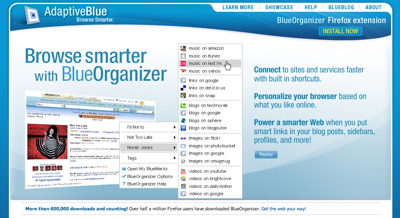AdaptiveBlue, a company we covered here and here last September when they debuted at DEMOfall, today launched the latest version of its BlueOrganizer plug-in for the Firefox browser, which it calls Denim. Alex Iskold, the founder and CEO, is a friend of mine, and a fellow writer at Read/Write Web. (Okay, I’ve written two posts there and he’s done what seems like 50 or more, and they’re all amazingly good.) How he finds time to do all this writing and run a startup, I don’t know. I’m threatening to start calling him Superman. Alex’s firm is based in New Jersey and was funded in a Series A round last fall by Union Square Ventures of New York City.
Anyway, I downloaded and installed the plug-in in about 30 seconds on my Mac. It’s an elegant solution — and the web site is very clean, well functioning, and informative, with good demos, graphics, and explanations. The plug-in worked flawlessly for me right from the start, and I’m now thinking it could turn me into more a Firefox user… 🙂

Duncan Riley reported on the launch today on Tech Crunch, noting that “Adaptive Blue also enters the widget market. The new ‘sharing links’ feature allows users to embed semantic links into any web page, include bookmark style lists in a sidebar, or just embed a traditional widget. Affiliate programs are fully supported with no revenue sharing; if a user includes their affiliate code for programs such as eBay and Amazon they keep 100% of any associated revenue.”
Richard MacManus also published a post today on BlueOrganizer on Read/Write Web, under the title “Semantic Web In Action?” He explained that BlueOrganizer “aims to provide extra contextual information to you while browsing the Web. Basically, after you install BlueOrganizer in Firefox, it enables you to discover all kinds of relevant content while you’re browsing – such as books, music, links, related information, etc. Essentially then, it adds personalization and semantics into the browser.”
How’s the new version of the plug-in different? “First,” says Alex, “it’s just much more fun! Its lighter, more clickable, and takes less space both in the toolbar and in the sidebar. There’s also a new BlueMenu right in the toolbar. This makes the menu much easier to use for people who are not into right-clicking.” He also says that the latest context detection algorithm “is a huge improvement over the previous versions. Try it on blog posts about books, music, wine or another topic and see for yourself.”
Probably the most important new feature is SmartLinks, according to Alex. “These are web links that feature contextual shortcuts. They carry all the smarts about the objects right into blog posts, web pages, and social network profiles.” With SmartLinks, he noted, you can share the power of context and semantics with your friends, family, or readers.
“This is fundamental and big,” Alex proudly points out. “We’re bringing semantics into the most basic element of the web – the link. Imagine the web where links no longer point to pages, but point to things….users can get to information faster; information that’s contextual and relevant.” While some people might call this the Semantic Web, “we would not be so presumptuous,” Alex says. “But we think BlueOrganizer and SmartLinks are powering a smarter web and that, in turn, paves the road to the real Semantic Web.”

Leave a Reply